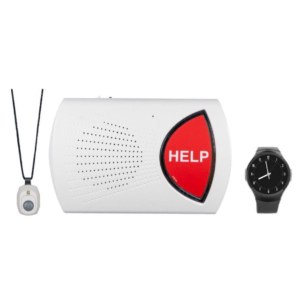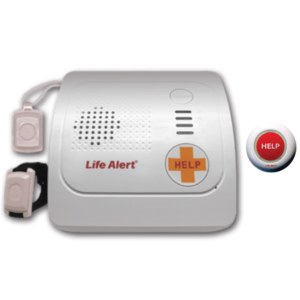Life Alert Vs. Bay Alarm Medical
While caregivers and family members want the older adults in our lives to be able to maintain their independence, safety is always a concern. There are so many things to consider: Can your loved one receive help in a timely manner if there is a medical emergency? Can they reach out for help both inside and outside of the home? If these are concerns you have about yourself or a loved one, you might consider using a medical alert device.
Who Should Consider a Medical Alert Device?
Medical alert devices can offer immediate assistance from emergency responders in the case of a medical emergency. The following people might consider using a medical alert device:
- People who live alone
- Elderly individuals
- Those reliant on mobility-assisted devices (walkers, canes, crutches, wheelchairs) due to physical impairments
- People with sensory deficits (vision or hearing)
- Those with a history of falls or who have a high risk of falling
- Individuals with a history of medication management problems
- Those with cognitive deficiencies or memory impairment
- People with a chronic medical condition that might require emergency services
When it comes to affordability, Bay Alarm Medical offers quality products for a competitive price. Bay Alarm Medical makes it easy for customers to understand exactly what they are purchasing while also offering add-on features for caregivers. Couple these factors with fast response times and excellent customer service reviews, and Bay Alarm Medical presents itself as offering an excellent product and service that can help keep you safe and independent in and out of your home. Not only does Bay Alarm Medical market to older adults, but the company’s advanced technology also appeals to family members, caregivers, or loved ones of any age who might benefit from a medical alert device. Bay Alarm Medical offers four easy-to-understand packages:
- In The Home
- On The Go
- SOS Smartwatch
- Bundle Package
In The Home Options
| Cost | |
| In-Home Basic | $24.95/month |
|---|---|
| In-Home Preferred | $29.95/month |
| In-Home Premium | $39.95/month |
| Connection Type | |
| In-Home Basic | Landline |
|---|---|
| In-Home Preferred | LTE Cellular |
| In-Home Premium | LTE Cellular |
| Startup/Activation Fee | |
| In-Home Basic | None |
|---|---|
| In-Home Preferred | None |
| In-Home Premium | None |
| Contract | |
| In-Home Basic | Not Required |
|---|---|
| In-Home Preferred | Not Required |
| In-Home Premium | Not Required |
On The Go Options
| Cost | |
| Mobile Lite | $29.95/month |
|---|---|
| Mobile Plus | $39.95/month |
| Mobile 360 Bundle | $49.95/month |
| Device Fee | |
| Mobile Lite | $79 |
|---|---|
| Mobile Plus | $79 |
| Mobile 360 Bundle | $79 |
| Caregiver Tracking | |
| Mobile Lite | Yes |
|---|---|
| Mobile Plus | Yes |
| Mobile 360 Bundle | Yes |
| Mobile Fall Detection | |
| Mobile Lite | No |
|---|---|
| Mobile Plus | Yes |
| Mobile 360 Bundle | Yes |
*Bay Alarm Medical offers free shipping and a free month for certain quarterly and annual payment plans, but you can also continue to pay monthly.
SOS Smartwatch Options
| Cost | |
| SOS Smart Watch | $29.95/month |
|---|---|
| In-Home Plus Smart Watch | $39.95/month |
| Device Fee | |
| SOS Smart Watch | $159 |
|---|---|
| In-Home Plus Smart Watch | $159 |
| Location Tracking | |
| SOS Smart Watch | Yes |
|---|---|
| In-Home Plus Smart Watch | Yes |
| Bundle Discount | |
| SOS Smart Watch | No |
|---|---|
| In-Home Plus Smart Watch | $39.95 |
Pros
-
No startup fees
-
No contracts
-
Wide range of affordable plans
-
Free coverage for a spouse
-
Variety of caregiver tools
Cons
-
Add-on features raise the monthly cost
-
Tech-forward options can be limiting for those seeking more basic features
See Our Full Bay Alarm Medical Review.
As a pioneer in personal emergency response systems (PERS), Life Alert handles over two million calls per year. In 2020, 40,095 people were saved from a catastrophic event by utilizing Life Alert. That equals one life saved every 11 minutes! When you put that into perspective, a company like Life Alert has clear benefits to older adults or those at increased risk of medical emergencies.
Compared to Bay Alarm Medical, Life Alert prices are a bit more expensive. With the company´s basic monthly package starting at $49 per month, you can expect to pay more for the Life Alert services. Regardless, the company maintains an A+ rating with the Better Business Bureau (BBB), and its customer service is great (senior safety is the No. 1 priority). Life Alert offers three options:
- Life Alert Master Unit—This is the base station for the in-home packages. The base station is equipped with its own help button and two-way direct communication with the monitoring center.
- Life Alert Mobile System—Help on the GO +GPS is the mobile system offered by Life Alert. This includes a help button worn as a necklace or bracelet, which is connected to your mobile device. The pendant has a lifetime guarantee, never needs charging, and has connection capabilities anywhere in the United States.
- Life Alert Help Button—This is a pendant-style help button that can be worn as a necklace or bracelet. It is lightweight and waterproof, allowing users to wear the device while active in the home and even in the shower. When the help button is pressed, it transmits a signal to the base station and connects you to the dispatchers at the emergency response center.
Pros
-
This medical alert company has proven itself, having been in business since 1987. With 30-plus years in the medical alert industry, it is a known, trustworthy, and reliable option.
-
Built-in backup batteries in the base stations last 72 hours, ensuring continued connection to the Life Alert emergency response center.
-
Waterproof pendants or medical alert bracelets can be worn in the shower. When determining where most falls occur, it was found that around 60 percent of falls occur within someone’s home. The National Institutes of Health determined that a fall in the bathroom was almost two and a half times more likely to result in injury than a fall in the living room. Waterproof equipment helps protect our loved ones in the higher risks areas of the home.
-
The fact that Life Alert operates its own call center allows for faster response times.
Cons
-
Minimum three-year contract requirement
-
Initial equipment fee of $95-$198
-
Lacking some features, such as automatic fall detection
-
On-The-Go plan only offered as an add-on
-
No free trial period
-
Poor pricing transparency—usually must contact customer service for exact pricing
See our full Life Alert Review.
Bay Alarm Medical vs. Life Alert
There are some questions you should ask yourself when trying to decide between Bay Alarm Medical and Life Alert:
- Do you spend most of your time at home or out in your community? This will help differentiate if you need an in-home or on-the-go system.
- Do you have difficulty with technology?
- Do you prefer automatic fall detection?
- Are you interested in caregiver tools, such as medication reminders, locked pillboxes, or a GPS location tracker?
It’s important for you to review the available packages for both Bay Alarm Medical and Life Alert to decide which plan best fits your situation.
Below you will find a comparison about the product and pricing of Bay Alarm Medical versus Life Alert.
| Water-Resistant? | |
| Bay Alarm Medical | Yes |
|---|---|
| Life Alert | Yes |
| Connection Types | |
| Bay Alarm Medical | Landline, LTE Cellular, mobile + GPS |
|---|---|
| Life Alert | Landline, LTE Cellular, mobile + GPS |
| Call Center | |
| Bay Alarm Medical | US-based, 24/7 availability |
|---|---|
| Life Alert | US-based, 24/7 availability |
| Call Button Range | |
| Bay Alarm Medical | Up to 1,000 feet |
|---|---|
| Life Alert | Up to 800 feet |
| Contract | |
| Bay Alarm Medical | Monthly, quarterly, annual contracts available |
|---|---|
| Life Alert | Minimum three-year contract required |
| In-Home System | |
| Bay Alarm Medical | $21.95/month |
|---|---|
| Life Alert | $49.95/month+ |
| Mobile System | |
| Bay Alarm Medical | $29.95/month |
|---|---|
| Life Alert | $89.95/month |
| Equipment Fee | |
| Bay Alarm Medical | None |
|---|---|
| Life Alert | None |
| Activation Fee | |
| Bay Alarm Medical | None on home system/Varies for mobile system |
|---|---|
| Life Alert | $95-$198 |
| Automatic Fall Detection | |
| Bay Alarm Medical | $10/month |
|---|---|
| Life Alert | No |
| GPS | |
| Bay Alarm Medical | Yes |
|---|---|
| Life Alert | Yes |
| Battery Life | |
| Bay Alarm Medical | Up to five years for the non-rechargeable in-home call button
Up to five days for the battery in the 4G/LTE button |
|---|---|
| Life Alert | Up to seven years for In the Home pendant battery
Up to 10 years for the wall-mounted HELP button and HELP On the Go with GPS device |
There are multiple options for medical alert companies and devices to choose from on the market today, and as such, trying to choose among them can get complicated. This article compares two reputable medical alert device companies to help you make the best choice based on your personal needs and preferences.
Why You Can Trust Us
At AgingInPlace.org, it is our goal to equip seniors and their family members with the most comprehensive and up-to-date reviews of assistive devices so that they can best prepare their home environments and successfully age in place. Collectively, our reviewers have spent over 1,700 hours conducting research through multiple modalities to provide you with valuable information on medical alert systems. The criteria considered most important in our ratings are reliability and the quality of the company’s monitoring center. It is also worth noting that companies that do not provide 24-hour, seven-day-a-week coverage are not considered when we are choosing our top picks.
The gold standard in quality assurance of a medical alert system is reached if a company achieves designation as one of The Monitoring Association’s (TMA) Five Diamond Alert Monitoring Centers. You might see companies refer to this on their website as their being Central Station Alarm Association (CSAA) Five Diamond Alert Monitoring Centers. (TMA was formerly known as CSAA.) Of the thousands of alarm companies operating in the US, roughly 200 earn TMA’s Five Diamond designation, a hallmark of quality emergency service.
You’ll also see companies advertise that they are ”UL-listed,” which is another quality indicator. UL stands for Underwriter’s Laboratory, so when you read that a company has UL-listed products, this means that they have been tested by this independent, nationally recognized laboratory and determined to meet specific safety requirements.
FAQs
-
The answer to this question will vary based on each unique individual’s needs. It’s important for you to review the available packages for both Bay Alarm Medical and Life Alert to decide which plan best fits your situation.
*Pricing accurate as of April 1, 2022.
WRITTEN BY
Danielle Pagano is a board certified Family Nurse Practitioner currently practicing Internal Medicine in rural Illinois. She has extensive experience in primary and long term care, including preventive medicine and complex chronic disease management. Danielle has participated in several medical mission trips, serving communities in Brazil, Kenya, and Ethiopia. As a working mother of three young children, Danielle appreciates spending her time outside connecting with nature while hiking or running, or relaxing with her husband.
MEDICALLY REVIEWED BY
Jenny is an Adult-Gerontology Primary Care Nurse Practitioner in NYC with a passion for working with aging adults and their family members. Prior to her clinical training at Vanderbilt School of Nursing, she worked in business and medical research at Harvard Business School and Massachusetts General Hospital. As a Caregiving Coach at Givers, Jenny helps family members manage the financial, emotional, and educational stresses of caring for their loved ones who are aging in place.







